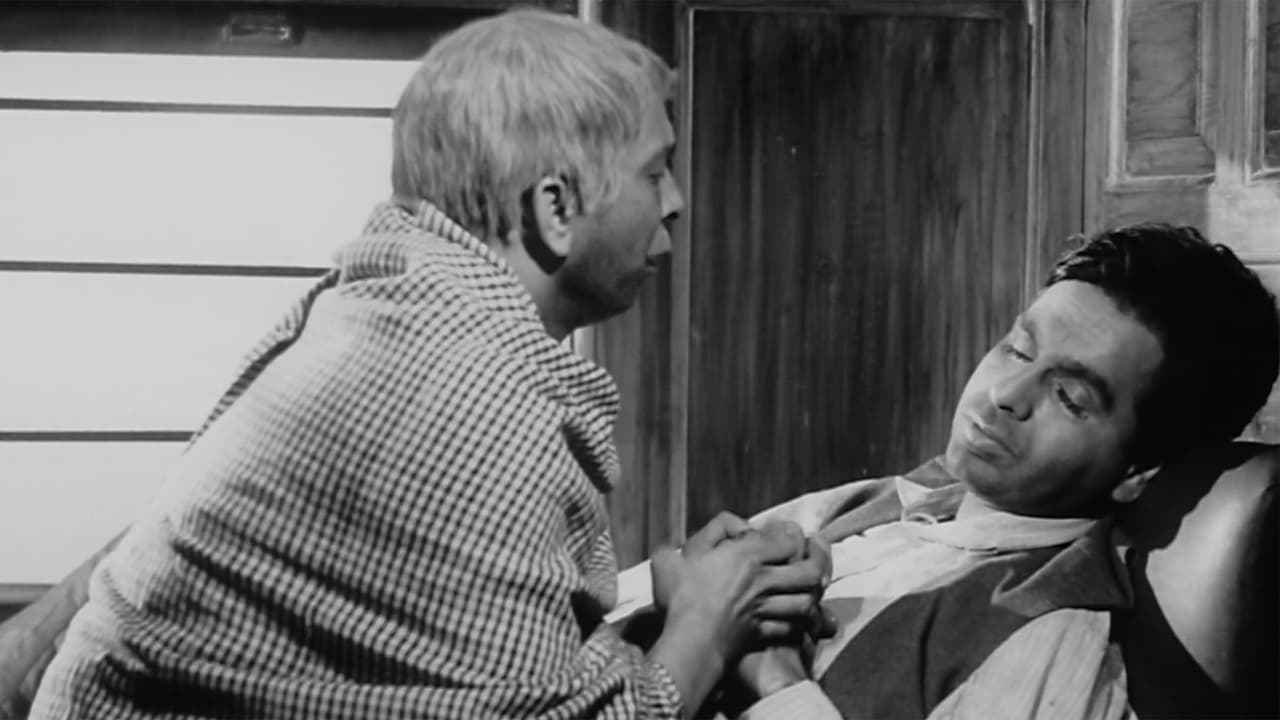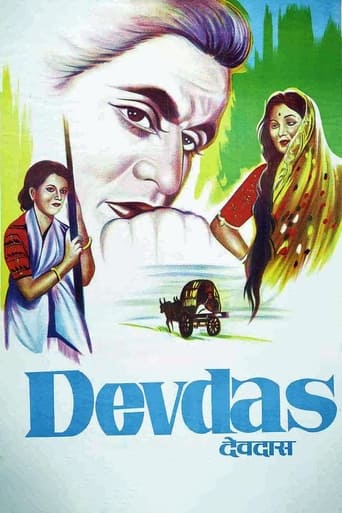

Wonderfully offbeat film!
... View MoreDreadfully Boring
... View MoreDon't listen to the Hype. It's awful
... View MoreIn other words,this film is a surreal ride.
... View MoreI'm writing - and viewed, this, as an English non-Indian, who simply loves film and is venturing from more obvious World Cinema, into the more obscure and possibly more rewarding.So, I'm more concerned with the story than who's playing whom and such. I came across the story, Devdas, via the 2002, very colourful and (at the time, may still be the case) most expensive Indian film, which is a feast to both eye and ear. I'll review that one, once I've re-watched my new DVD of it, having only seen on TV.The universal and accessible story, written as early as 1917 is of two childhood sweethearts - Parvati and the titular Devdas, who grow up but go their separate ways. Devdas flees to Calcutta and seeking the high- life, frequents a brothel and starts drinking; to the extent that he comes alcoholic. She marries a wealthy husband. They both regret their parting and long for what could have been. Devdas befriends a pretty prostitute - Chandramukhi - who desperately wants to love the Devdas that she inwardly sees, but cannot reach. His loves are for his childhood sweetheart - and the alcohol, only. Add family issues and you've got a nice pot-boiler of emotion, drama and pathos throughout the 160 minute run-time.Many think, wrongly, that Indian cinema is nothing but Bollywood - lightweight singing and dancing and that serious issues on Life are either treated in a dismissive way, or not at all. In many ways, this story could be Shakespearian, or made for the Golden era of Hollywood. What makes it endlessly fascinating is of course the different culture, from marriage and fidelity to the simple poetic beauty in the landscape and costume.There is some singing and dancing in this 1955 black & white version, but little compared to a Bollywood production and much of what there is are the rituals of the working ladies that venture into Devdas' sordid existence.Naturally, this monochrome - and much earlier film than the 2002 one, is poorer in picture and sound quality. Mine (cover exactly as shown) had a varying faint green/olive colour cast, had quite a few blemishes picked up through time and was slightly soft. The sound is OK, if you're not fussy. However, I know that this quality is typical, for Indian film of this period. However, one gets used to it and almost comforted by it, being more intense, somehow. At least is doesn't look like a video- transfer, thankfully.From what I gather, many agree that Bimal Roy's film, here, is the definitive adaptation, though it was made earlier, the first of which was in 1928! For popularists and lovers of colour and spectacle, go for the 2002 glossy version. If the story and the acting and a purer form of beauty is what you're after, then this one will have you enthralled. Though the film itself is a four and half starrer, I've not rounded it up, due to transfer quality issue.
... View MoreThis is another film by the great Bimal Roy. Based on Sarat Chandra's famous Bengali novel "Debdas", "Devdas" (1955) is one of Bimal Roy's handful of films that are adaptations of Bengali novels and short stories; others include "Parineeta" (1953) and "Kabuliwallah" (1960). In comparison with its successor "Devdas" (2002), Bimal Roy's "Devdas" (1955) provides a more realistic backdrop. The buildings, such as Devdas' and Paro's houses as well as the brothel in which Chandramukhi dances are relatively simple, unlike their over-extravagant replicas in the recent adaptation by Sanjay Leela Bhansali. Also, the costumes are simple and reflect the lifestyles of rural Bengalis in the past, much unlike Sanjay Leela Bhansali's adaptation that features too much jewellery, gold embroidery, rich brocades and fabulous fabrics. In addition to that, this film has great and subliminal histrionic performances by Dilip Kumar, Suchitra Sen and Vyjayanthi Mala. I was captivated by Dilip Kumar's perfect picturisation of a drunk, lovesick Devdas. His dialogues are simple and easier to understand, in comparison with Shahrukh Khan's role, who speaks lots of flowery language. Apart from that, Dilip Kumar's blurred glint in his eyes while playing the drunk Devdas scene with Vyjayanthi Mala is simply natural. Leading Bengali-film tragedy queen Suchitra Sen played Paro in this film, and her performance was the greatest. In my opinion, Paro's (Aishwarya Rai) reaching out to a dying Devdas (Shahrukh Khan) towards the story's end in Sanjay Leela Bhansali's adaptation was merely a copy of Suchitra Sen's act in this film: the saris featured in the same scene from both films were exactly the same, too! I strongly feel that Suchitra Sen's performance was at its strongest during this scene, and no other actress can possibly duplicate it. Last but not least, the round of applause should also go to Bollywood's legendary Dancing Queen, Vyjayanthi Mala. She was handpicked by Bimal Roy for her flawless dancing skills. Nevertheless, she not only spiced the film with her fluid Kathak; she also gave the audience a never-seen-before melodramatic side of herself when she played the converted Chandramukhi. Madhuri Dixit's role was simply out of the question whereby she even met up with Paro! Moreover, one ought to note that Chandramukhi is just a courtesan, not a diva, as portrayed by Madhuri Dixit. In short, Vyjayanthi Mala has successfully proved her versatility through Chandramukhi in this film. On top of that, "Devdas" (1955) has a beautiful original musical score. The biggest credit should go to Lataji, who was, at that time, enjoying early success. Her melodious voice made the mujras "Aa Gayi Teri Marzi" and "O Jaane Wale" as well as the touching "Jisse Tu Kabool Kar Le Voh" all-time best-loved nostalgic hits. In a nutshell, Bimal Roy's "Devdas" (1955) will always rank as an evergreen classic in the charts of Bollywood, thanks to the unforgettable acting by Dilip Kumar, Suchitra Sen and Vyjayanthi Mala, Lataji, Talat Mehmood, Mubarak Begum, Asha Bhosle and Usha Mangeshkar's melodious voices as well as the memorable direction of the great film-maker Bimal Roy.
... View MoreLike "Gone With The Wind" and Wuthering Heights, Devdas is based on a literary classic and is a landmark in cinema. Pre-independence Bengal and Calcutta come alive in this movie but it is not a pretty picture. The story itself verges on bathos, with a young man, Devdas (Kumar), drinking himself to death after his childhood chum and beloved Paro (Sen) marries another (older) wealthy man. That marriage happens only because Devdas' wealthy father and older brother refused to allow him to marry Paro, the middle caste girl next door. The pain is, she loves Devdas too, but cannot act on it.The parallel story has Chandramukhi (Vyjayanthimala), a dancer & call girl from Calcutta, falling in love with Devdas as well while he is drinking away his sorrows. But he is so focused on Paro and so negatively judges Chandramukhi's profession, he cannot notice her. When Devdas finally appreciates Chandramukhi's devotion, for her own safety he dare not take her home.This is a sorrowful classic, but with the overwrought pain, it plays more like "Wuthering Heights" than like "Gone With the Wind".
... View MoreI watched this movie a couple of days ago. No doubt the movie is considered a masterpiece of Indian Cinema. Even though the movie is nearly half a century old, it has the power to captivate the audience. The superb acting by nearly all the actors further enhances its value. Though today's generation may find it's pace somewhat slow.It has more than mere entertainment value. Like "Gone With The Wind", it deals with an era that has gone forever. Pre-independence Bengal and Calcutta come alive in this movie. Its portrayal of life of landed gentry pre-independence Bengal is quite authenticate.In short, A must see for all those who have always wondered why every broken heart self-destructive lover is called a Devdas.
... View More